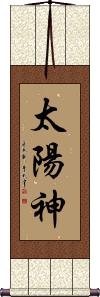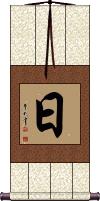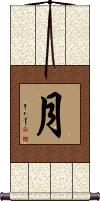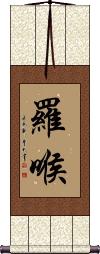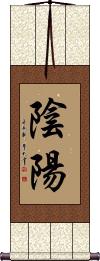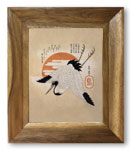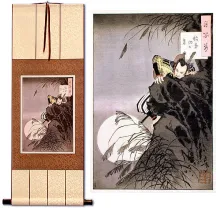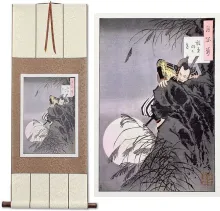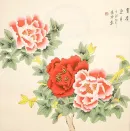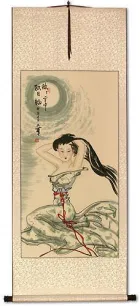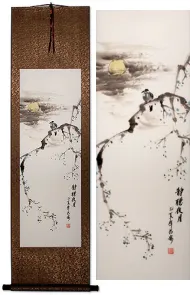Many custom options...
And formats...

The name Sun Moon in Chinese / Japanese...
Buy a Sun Moon calligraphy wall scroll here!
Personalize your custom “Sun Moon” project by clicking the button next to your favorite “Sun Moon” title below...
Apollo
太陽神 means “Sun God” in Chinese, Japanese, and Korean.
It's used in Chinese to mean the Greek God Apollo. This can also be used in Chinese to refer to Nasa's Apollo missions to the moon.
This is how to write “day” in Chinese, Japanese, and Korean Hanja.
This can also mean “Sun,” the star in the middle of the Solar system in which we live. In Japanese, it can also mean “sunshine” or even “Sunday.”
When writing the date in modern Chinese and Japanese, putting a number in front of this character indicates the day of the month. Of course, you need to indicate the month too... The month is expressed with a number followed by the character for the moon. So “three moons ten suns” would be “March 10th” or “3/10.”
Note: This is also the first character for the proper name of Japan. Remember that Japan is “The land of the rising sun”? Well, the first character for Japan means “sun” and the second means “origin” so you get the real meaning now. Sometimes, in China, this sun character can be a short name for Japan or a suffix for something of or from Japan.
Moon
月 is how to write the title for “moon” in Chinese, Korean Hanja, and Japanese Kanji.
月 is also used to refer to the month. This is because China traditionally uses a lunar calendar, so saying “next moon” is the same as saying “next month” etc.
In modern Chinese and Japanese and old Korean, the character for a number is put in front of this moon character to represent western months. So “one moon” is January “two moons” is February etc.
If you are wondering, in the east Asian way to write dates, the character for “sun” or “day” is used with a number in front of it to express the day of the month. So “ten moons, one sun” becomes “October 1st” or “10/1” (this date happens to be Chinese National Day - The equivalent of Independence Day in the USA, Canada Day, or the Queen's Birthday).
In Japanese, 月 can be a surname that romanizes as Tsuki, Tsukizaki, or Takagetsu.
Rago
This is a Japanese personal name, Rago.
The meaning can be the intersection of the Moon's orbit with the ecliptic in Vedic astronomy (from Sanskrit Rāhu).
In Buddhist context, this can be, “the demon who is supposed to seize the sun and moon and thus cause eclipses.”
This is a variant of the Chinese 羅睺. It can also be written 羅護 or 羅虎. If you need the more ancient Chinese version, just let me know.
The Sun, Moon, and Stars
日月星辰 is a title that encompasses all of the heavenly bodies or celestial bodies.
Namely, this includes the Sun, Moon, and Stars of our universe.
Sun Moon Stars
Yin Yang
陰陽 literally means yin and yang in written form (versus the common yin-yang symbol). The first character has the element of the moon, while the second character has the element of the sun so that you can see, even in written form, they suggest the balance of opposites (of night and day). You could also translate this title as “sun and moon.”
Note: This title is often misspelled as Ying Yang instead of Yin Yang.
See Also: Taoism
This in-stock artwork might be what you are looking for, and ships right away...
Gallery Price: $108.00
Your Price: $59.88
Gallery Price: $108.00
Your Price: $59.88
Gallery Price: $61.00
Your Price: $33.88
Gallery Price: $61.00
Your Price: $33.88
Gallery Price: $61.00
Your Price: $33.88
Gallery Price: $61.00
Your Price: $33.88
Gallery Price: $200.00
Your Price: $88.88
Gallery Price: $220.00
Your Price: $79.88
Gallery Price: $220.00
Your Price: $79.88
Gallery Price: $108.00
Your Price: $59.88
Gallery Price: $220.00
Your Price: $79.88
Gallery Price: $126.00
Your Price: $69.88
Not the results for sun moon that you were looking for?
Below are some entries from our dictionary that may match your sun moon search...
| Characters If shown, 2nd row is Simp. Chinese |
Pronunciation Romanization |
Simple Dictionary Definition |
陰陽 阴阳 see styles |
yīn yáng yin1 yang2 yin yang inyou(p); onmyou; onyou / inyo(p); onmyo; onyo いんよう(P); おんみょう; おんよう |
More info & calligraphy: Yin Yangcosmic dual forces; yin and yang; sun and moon, etc.; (place-name) In'you yin and yang |
日月星辰 see styles |
jitsugetsuseishin; nichigetsuseishin / jitsugetsuseshin; nichigetsuseshin じつげつせいしん; にちげつせいしん |
More info & calligraphy: The Sun, Moon, and Stars |
出 see styles |
chū chu1 ch`u chu de で |
to go out; to come out; to arise; to occur; to produce; to yield; to go beyond; to exceed; (used after a verb to indicate an outward direction or a positive result); classifier for dramas, plays, operas etc (n,n-suf) (1) coming out; going out; outflow; efflux; rising (of the Sun or the Moon); (n,n-suf) (2) attending (work); appearing (on stage); one's turn to go on; (n,n-suf) (3) start; beginning; (n,n-suf) (4) origins; background; person (or item) originating from ...; graduate of ...; native of ...; member of ... (lineage); (n,n-suf) (5) architectural member that projects outward; (n,n-suf) (6) highest point of the stern of a ship; (n,n-suf) (7) (kana only) (usu. after the -masu stem of a verb as 〜出がある or 〜出がない, etc.) amount (comprising something); amount of time or effort required to do something; (surname) De To go out, come forth, put forth; exit; beyond. |
暈 晕 see styles |
yùn yun4 yün kasa; un かさ; うん |
dizzy; halo; ring around moon or sun halo (around the Sun, Moon, etc.); ring; corona; (surname) Higasa |
曜 see styles |
yào yao4 yao you / yo よう |
bright; glorious; one of the seven planets of premodern astronomy (female given name) Yō Brilliant, shining. 七曜 The sun, moon, and five planets. 曜宿 These seven and the constellations, the celestial orbs. |
七曜 see styles |
qī yào qi1 yao4 ch`i yao chi yao shichiyou / shichiyo しちよう |
the seven planets of premodern astronomy (the Sun, the Moon, Mercury, Venus, Mars, Jupiter, and Saturn) (1) {astron} the seven luminaries (sun, moon, Mercury, Venus, Mars, Jupiter and Saturn); (2) the seven days of the week The seven brilliant ones — the sun and moon, together with the five planets which are connected with fire, water, wood, metal, and earth. Their essence shines in the sky, but their spirits are over men as judges of their good and evil, and as rulers over good and evil fortune. The following list shows their names in Chinese and Sanskrit: Sun 日, 太陽; aditya 阿彌底耶 Moon月, 太陰; soma 蘇摩 Mars火星, 勢惑勞; aṅgāraka 盎哦囉迦 Mercury水星, 辰星; budha 部陀 Jupiter木星, 歳星; bṛhaspati 勿哩訶娑跛底 Venus金星, 太白; śukra 戌羯羅 Saturn土星, 鎭星; śanaiścara 賖乃以室折羅. |
七難 七难 see styles |
qīn án qin1 an2 ch`in an chin an shichinan しちなん |
(1) {Buddh} the Seven Misfortunes; (2) great number of faults or defects The seven calamities in the仁王經, 受持品 during which that sūtra should be recited: sun and moon losing their order (eclipses), conste11ations, irregular, fire, flood, wind-storms, drought, brigands Another set is — pestilence, invasion, rebe11ion, unlucky stars, eclipses, too early monsoon, too late monsoon. Another is — fire, flood, rakṣas, misrule, evil spirits, cangue and prison, and robbers. |
三光 see styles |
sān guāng san1 guang1 san kuang sankou / sanko さんこう |
the sun, the moon, and the stars (1) (poetic term) the Sun, the Moon and the stars; (2) {hanaf} three 20-point cards (high-scoring meld); (personal name) Miteru (三光天) Sun, moon, and stars. Also, in the second dhyāna of the form-world there are the two deva regions 少光天, 無量光天, and 光音天q.v. Also 觀音 Avalokiteśvara is styled 日天子sun-prince, or divine son of the sun, 大勢至 Mahāsthāmaprapta is styled 月天子 divine son of the moon, and 虛空藏菩薩 the bodhisattva of the empyrean, is styled 明星天子 divine son of the bright stars. |
上山 see styles |
shàng shān shang4 shan1 shang shan jouyama / joyama じょうやま |
to climb a hill; to go to the mountains; (of silkworms) to go up bundles of straw (to spin cocoons); to pass away; (of the sun or moon) to rise (surname) Jōyama |
下山 see styles |
xià shān xia4 shan1 hsia shan gezan(p); gesan げざん(P); げさん |
to go down a hill; (of the sun or moon) to set (n,vs,vi) (ant: 登山) descending a mountain; descent; (place-name) Nizayama |
九曜 see styles |
jiǔ yào jiu3 yao4 chiu yao kuyou / kuyo くよう |
(surname) Kuyou 九執 q.v. Navagraha. The nine luminaries: 日 Āditya, the sun; 月 Sōma, the moon; the five planets, i.e. 火星 Aṅgāraka, Mars; 水 Budha, Mercury; 木 Bṛhaspati, Jupiter; 金 Sukra, Venus; and 土 Śanaiścara, Saturn; also 羅睺 Rāhu, the spirit that causes eclipses; and 計都 Ketu, a comet. Each is associated with a region of the sky and also with a bodhisattva, etc., e.g. the sun with Guanyin, Venus with Amitābha, etc. |
五夢 五梦 see styles |
wǔ mèng wu3 meng4 wu meng itsumu いつむ |
(female given name) Itsumu The five bad dreams of King Ajātaśatru on the night that Buddha entered nirvana— as the moon sank the sun arose from the earth. the stars fell like rain, seven comets appeared, and a great conflagration filling the sky fell on the earth. |
五翳 see styles |
wǔ yì wu3 yi4 wu i go ei |
The five films, or interceptors of the light of sun and moon— smoke, cloud dust, fog, and the hands of asuras. |
入る see styles |
iru いる |
(v5r,vi) (1) (mainly used in fixed expressions and literary language) (See 入る・はいる・1) to enter; to go in; to get in; to come in; (v5r,vi) (2) to set (of the sun or moon); to sink; to go down; (v5r,vi) (3) to attain (nirvana, enlightenment, etc.); to achieve; to reach (e.g. a climax); (suf,v5r) (4) (after -masu stem of verb) (See 感じ入る,聞き入る) to do fully; to do intently; to do sincerely; to do deeply; to feel keenly; (suf,v5r) (5) (after -masu stem of verb) (See 寝入る・1,絶え入る) to (reach a state) completely; (place-name) Iru |
入方 see styles |
irikata いりかた |
time of setting (sun, moon, etc.); (place-name, surname) Irikata |
初升 see styles |
chū shēng chu1 sheng1 ch`u sheng chu sheng |
rising (sun, moon etc) |
四翳 see styles |
sì yì si4 yi4 ssu i shiei |
The four films, or things that becloud, i. e. rain-clouds; dust-storms; smoke; and asuras, i. e. eclipses of sun and moon; emblematic of desire, hate, ignorance, and pride; cf. 四結. |
堕つ see styles |
otsu おつ |
(v2t-k,vi) (1) (archaism) to fall down; to drop; to fall (e.g. rain); to sink (e.g. sun or moon); to fall onto (e.g. light or one's gaze); (2) (archaism) to be omitted; to be missing; (3) (archaism) to crash; to degenerate; to degrade; to fall behind; (4) (archaism) to be removed (e.g. illness, possessing spirit, name on a list); (5) (archaism) to fall (into someone's hands); to become someone's possession; (6) (archaism) to fall; to be defeated; to surrender |
墜つ see styles |
otsu おつ |
(v2t-k,vi) (1) (archaism) to fall down; to drop; to fall (e.g. rain); to sink (e.g. sun or moon); to fall onto (e.g. light or one's gaze); (2) (archaism) to be omitted; to be missing; (3) (archaism) to crash; to degenerate; to degrade; to fall behind; (4) (archaism) to be removed (e.g. illness, possessing spirit, name on a list); (5) (archaism) to fall (into someone's hands); to become someone's possession; (6) (archaism) to fall; to be defeated; to surrender |
大刧 大劫 see styles |
dà jié da4 jie2 ta chieh daikō |
mahākalpa. The great kalpa, from the beginning of a universe till it is destroyed and another begins in its place. It has four kalpas or periods known as vivarta 成刧 the creation period; vivarta‐siddha 住刧 the appearance of sun and moon, i.e. light, and the period of life, human and general; saṃvarta 壤刧 or 滅刧 destruction first by fire, then water, then fire, then deluge, then a great wind, i.e. water during seven small kalpas, fire during 56 and wind one, in all 64; saṃvartatthāhi 増滅刧 total destruction gradually reaching the void. A great kalpa is calculated as eighty small kalpas and to last 1,347,000,000 years. |
天女 see styles |
tiān nǚ tian1 nv3 t`ien nü tien nü tennyo てんにょ |
(1) heavenly nymph; celestial maiden; (2) beautiful and kind woman; (female given name) Tennyo devakanyā; apsaras; goddesses in general; attendants on the regents of the sun and moon; wives of Gandharvas, the division of the sexes is maintained throughout the devalokas 六 天. |
成劫 see styles |
chéng jié cheng2 jie2 ch`eng chieh cheng chieh joukou; jougou / joko; jogo じょうこう; じょうごう |
{Buddh} (See 四劫) the kalpa of formation (the first aeon of the universe) vivarta kalpa, one of the four kalpas, consisting of twenty small kalpas during which worlds and the beings on them are formed. The others are: 住劫 vivarta-siddha kalpa, kalpa of abiding, or existence, sun and moon rise, sexes are differentiated, heroes arise, four castes are formed, social life evolves. 壞劫saṃvarta kalpa, that of destruction, consisting of sixty-four small kalpas when fire, water, and wind destroy everything except the fourth dhyāna. 空劫 saṃvarta-siddha kalpa, i.e. of annihilation. v. 劫波. |
日月 see styles |
rì yuè ri4 yue4 jih yüeh jitsugetsu; nichigetsu じつげつ; にちげつ |
the sun and moon; day and month; every day and every month; season; life and livelihood (1) sun and moon; (2) time; days and months; years; (3) (にちげつ only) Sunday and Monday; (female given name) Hizuki sun and moon |
星宿 see styles |
xīng xiù xing1 xiu4 hsing hsiu shōshuku ほとほりぼし |
constellation (arch., now 星座); one of the 28 constellations of traditional Chinese astronomy and astrology; motion of stars since one's birth (predetermining one's fate in astrology) (1) (astron) constellation; (2) (astron) (archaism) mansion (any of the Chinese constellations used to divide the ecliptic into 28 positions); (3) (astron) Chinese "star" constellation (one of the 28 mansions) The twenty-eight Chinese constellations 二十八宿; also the twenty-eight nakṣatras; the 十二宮 twelve rāṣi, or zodiacal mansions; and the 七曜 seven mobile stars: sun, moon, and five graha or planets; all which are used as auguries in 星占法 astrology. A list giving Sanskrit and Chinese names, etc・, is given in 佛學大辭典, pp. 1579-1 580. |
星曜 see styles |
xīng yào xing1 yao4 hsing yao |
heavenly bodies (esp. the sun, moon or five visible planets) |
月日 see styles |
tsukihi つきひ |
(1) time; years; days; (one's) life; (2) (See 日月・1) the Moon and the Sun |
烏兎 see styles |
uto うと |
(1) (abbreviation) (See 金烏玉兎) sun and moon; (2) time; the years; the months |
羅睺 罗睺 see styles |
luó hóu luo2 hou2 lo hou rago; ragou / rago; rago らご; らごう |
the intersection of the Moon's orbit with the ecliptic in Vedic astronomy (Sanskrit rahu) Rago; mythological celestial body and-or evil spirit (asura) said to cause eclipses Rāhu, also羅護; 羅虎; "the demon who is supposed to seize the sun and moon and thus cause eclipses." M.W. |
落つ see styles |
otsu おつ |
(v2t-k,vi) (1) (archaism) to fall down; to drop; to fall (e.g. rain); to sink (e.g. sun or moon); to fall onto (e.g. light or one's gaze); (2) (archaism) to be omitted; to be missing; (3) (archaism) to crash; to degenerate; to degrade; to fall behind; (4) (archaism) to be removed (e.g. illness, possessing spirit, name on a list); (5) (archaism) to fall (into someone's hands); to become someone's possession; (6) (archaism) to fall; to be defeated; to surrender |
落る see styles |
ochiru おちる |
(irregular okurigana usage) (v1,vi) (1) to fall down; to drop; to fall (e.g. rain); to sink (e.g. sun or moon); to fall onto (e.g. light or one's gaze); to be used in a certain place (e.g. money); (2) to be omitted; to be missing; (3) to decrease; to sink; (4) to fail (e.g. exam or class); to lose (contest, election, etc.); (5) to crash; to degenerate; to degrade; to fall behind; (6) to become indecent (of a conversation); (7) to be ruined; to go under; (8) to fade; to come out (e.g. a stain); to come off (e.g. makeup); to be removed (e.g. illness, possessing spirit, name on a list); (9) to fall (into someone's hands); to become someone's possession; (10) to fall (into a trap); to fall (for a trick); (11) to give in; to give up; to confess; to flee; (12) to fall; to be defeated; to surrender; (13) to come to (in the end); to end in; (14) to fall (in love, asleep, etc.); (15) to swoon (judo); (16) to consent; to understand; (17) (computer terminology) to crash; to freeze; (18) to die; (19) to move to the depths |
Click here for more sun moon results from our dictionary
The following table may be helpful for those studying Chinese or Japanese...
| Title | Characters | Romaji (Romanized Japanese) | Various forms of Romanized Chinese | |
| Apollo | 太陽神 太阳神 | taiyoushin / taiyoshin | tài yáng shén tai4 yang2 shen2 tai yang shen taiyangshen | t`ai yang shen taiyangshen tai yang shen |
| Day | 日 | hi / nichi | rì / ri4 / ri | jih |
| Moon | 月 | tsuki | yuè / yue4 / yue | yüeh |
| Rago | 羅喉 | ragou / rago | luó hóu / luo2 hou2 / luo hou / luohou | lo hou / lohou |
| The Sun, Moon, and Stars | 日月星辰 | nichigetsuseishin | rì yuè xīng chén ri4 yue4 xing1 chen2 ri yue xing chen riyuexingchen | jih yüeh hsing ch`en jihyüehhsingchen jih yüeh hsing chen |
| Sun Moon Stars | 日月星 | nichigetsusei | rì yuè xīng ri4 yue4 xing1 ri yue xing riyuexing | jih yüeh hsing jihyüehhsing |
| Yin Yang | 陰陽 阴阳 | in you / inyou / in yo | yīn yáng / yin1 yang2 / yin yang / yinyang | |
| In some entries above you will see that characters have different versions above and below a line. In these cases, the characters above the line are Traditional Chinese, while the ones below are Simplified Chinese. | ||||
Successful Chinese Character and Japanese Kanji calligraphy searches within the last few hours...
